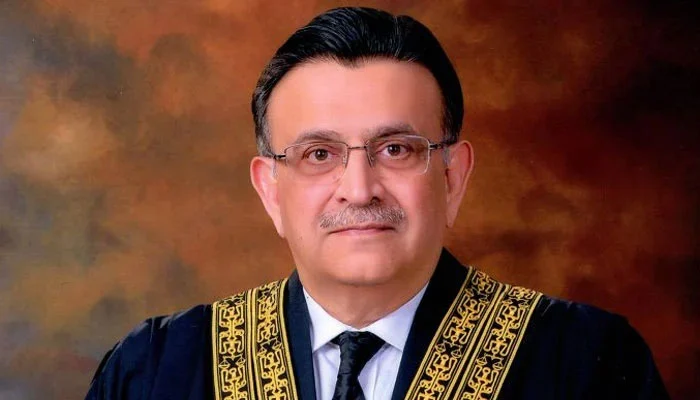A three-member Supreme Court bench on Friday rejected request of Attorney General for Pakistan (AGP) Mansoor Awan for the formation of a full court to hear petition against the Election Commission of Pakistan’s decision to postpone elections to the Punjab Assembly till Oct 8.
The case was heard by Chief Justice of Pakistan (CJP) Umar Ata Bandial, Justice Ijazul Ahsan and Justice Munib Akhtar following recusal of the two judges from the original five-member bench.
The original bench included Chief Justice of Pakistan (CJP) Umar Ata Bandial, Justice Ijazul Ahsan ,Justice Munib Akhtar, Justice Jamal Khan Mandokhail and Justice Aminuddin Khan.
When AGP requested for the full court during the hearing, the CJP remarked that the inclusion of new judges to bench would further waste time as proceedings into case had been conducted for three days.
“It will take time for the new judges to understand the case,” he observed, adding that Article 184(3) of the Supreme Court Rules 1980 was clear on the matter.
Justice Akhtar also said that it was everyone’s right to request a full court but the government giving the impression that benches were formed on “favouritism” was a serious accusation. “The Supreme Court has said that the CJP is the master of making benches,” he added.
“The court has always given precedence to the Constitution,” Justice Bandial asserted, recalling that judges in the past were taken out of their offices and jailed in their houses. “It is a miracle that they returned to the office, but some of the best judges in the 1990s could not come back,” he added.
“Constitution is very important for us; for this nation; for this society; it holds the federation together; it keeps alive democracy; today when you go to Parliament you find people addressing the Parliament who were till yesterday in captivity, imprisoned, declared traitors; they are now talking over there, and being respected; because they are representatives of the people,” the CJP was quoted as saying in a press release issued by the Supreme Court.
During the hearing today, the CJP noted that the date for the election suggested by the president was already beyond the 90-day time period. “The president was not briefed about the situation by the ECP.
“If they had done it, the president would not have given the date for April 30,” he said, pointing out that the matter in front of the court was of Oct 8.
The CJP asked whether the government gave concrete reasons for delaying election or start a dialogue with opposition. “We can take a break for a few days if the government and opposition want to hold negotiations. If the negotiations don’t work out, we fulfil our constitutional role.”
But first, he continued, tell the court about the Rs20 billion expenditure on the elections. The CJP also recalled that he had suggested a cutback on government expenditures earlier.
The CJP then highlighted the issue of terrorism in the country, saying that half of the polling stations were either sensitive or highly sensitive. “Only saying that there is terrorism in the country is not enough. Terrorism has been around since the 90s.
“The court was told that the armed forces are busy at the border. This matter has to be looked at as well,” he said.
The AGP then highlighted that the government was facing a deficit of Rs1,500bn and the interest rate had increased by 13 per cent, which he said was increasing the government’s debt.
“Will the government go bankrupt by issuing Rs20bn [for elections],” Justice Ahsan asked.
Meanwhile, Justice Akhtar asked the AGP to simply tell if the elections could be postponed till Oct 8. “How much money does the government have right now? How much money is available in the federal consolidated funds?
“If Rs20bn are spent, how much of the Rs1,500bn deficit will increase?” Justice Akhtar asked and then noted that the elections expenses were less than 1pc of the deficit.
In his response, the AGP said Rs170bn was expected in the supplementary budget.
“Whose control are the federal consolidated funds in?” Justice Akhtar inquired to which Awan replied that they were in the hands of the finance ministry.
“Read out the 2019 rules and tell us who controls the funds,” the judge directed, highlighting that as per the Public Financial Management Act, the consolidated funds were deposited in the State Bank of Pakistan (SBP). “We can call the SBP and ask them how much money they have.
“The ECP is looking at the government … it says that if funds are provided elections can be held on April 30,” he added.
Here, the CJP pointed out that having money in funds and having it available for spending were two different things. “The SBP has to keep money and gold reserves,” he added.
The court then summoned the secretaries of finance and defence to court and adjourned the hearing till Monday (April 3).



